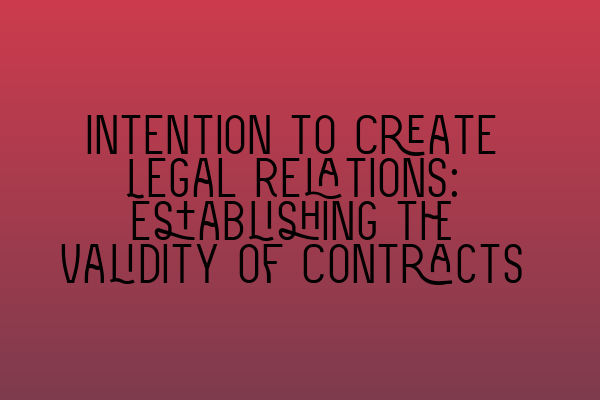Intention to Create Legal Relations: Establishing the Validity of Contracts
Welcome to our comprehensive guide on the concept of intention to create legal relations and its significance in determining the validity of contracts. Whether you are a law student preparing for the SQE 1 exam or a legal professional seeking to refresh your knowledge, understanding this fundamental aspect of contract law is essential.
Before we delve into the details, if you are looking for practice exam questions for SQE 1, click here to access our SQE 1 practice exam questions, or if you prefer mock exams, check out our SQE 1 practice mocks FLK1 FLK2.
What is Intention to Create Legal Relations?
In contract law, intention to create legal relations refers to the intention of parties to enter into a legally binding agreement. It is a vital component that establishes the foundation of contractual obligations. Without this intention, an agreement will not be enforceable by law.
There are two main categories when it comes to intention to create legal relations:
- Domestic or Social Agreements: These agreements are typically made between family members or close friends, and there is usually no intention to create legal relations. The law considers these agreements as social arrangements rather than legally binding contracts. However, there may be exceptions where parties have expressed a clear intention to create legal relations.
- Commercial Agreements: In commercial agreements, there is generally a presumption of intention to create legal relations. The parties involved are presumed to have intended their agreement to be legally enforceable. However, this presumption can be rebutted if there is evidence to the contrary.
To further explore the topic of intention to create legal relations, it is crucial to understand the different factors that courts consider when determining the intent of the parties involved.
Factors Considered in Determining Intention to Create Legal Relations
Courts consider various factors to ascertain the intention of the parties. These factors include:
- Express Statements: If the parties have explicitly stated their intention to create legal relations, courts will generally uphold this intention.
- Commercial Context: In commercial transactions, the law favors an intention to create legal relations, as commercial agreements are presumed to have a legal and binding purpose.
- Consideration: The presence of consideration, which refers to something of value exchanged between the parties, is indicative of an intention to create legal relations. Adequate consideration is an essential element of a valid contract.
- Legal Formalities: If the parties have followed legal formalities, such as drafting a written agreement, it demonstrates a clear intention to create legal relations.
- Past Behavior: Previous conduct between the parties and established practice in their relationship may be taken into account to determine their intention.
- The Nature of the Agreement: Certain agreements, such as those related to business transactions, employment, or real estate, are more likely to be deemed as having an intention to create legal relations.
The Consequences of Establishing an Intention to Create Legal Relations
When the court determines that the parties intended to create legal relations, the agreement becomes enforceable, and the parties are bound by their obligations. Breach of such contracts can result in legal remedies, such as damages or specific performance.
If you are preparing for the SQE 2 exam, we offer SQE 2 preparation courses that will help you further develop your understanding of contract law and other areas of legal practice.
Conclusion
The intention to create legal relations is a crucial element in determining the validity of contracts. Understanding the factors considered by courts in establishing this intention is vital to navigate the complexities of contract law. Whether you are studying for the SQE 1 exam or seeking to enhance your legal knowledge, grasp the concept of intention to create legal relations to ensure success in your legal career.
If you are looking for SQE 1 preparation courses or want to know more about the SRA SQE exam dates, visit our website.
